The 2023 BMW M4 CSL (Competition, Sport, Lightweight) is a sport coupe in search of a racetrack, but an hour on this mountain road outside of Palm Springs is my only option. The M4 CSL goes beyond the capability of the already bonkers M4 Competition with 240 pounds of weight savings, more power, and a spate of parts that seem more at home on a race car than a street machine.
The carbon-fiber front seats are foremost on my mind among those parts because the driver seat has just two adjustments, forward and back. It determines my seating position more than I do—how upright I sit and how snugly I’m cocooned. Its tall side bolsters make climbing into and out of the car a pain. Once in, the bolsters hug my hips but don’t pinch them, and the seat does a good job of putting me in a command position to control the car. The front seats save 53 pounds and removing the rear seats and seat belts cuts another 46 pounds. If the seats didn’t make getting in and out such a pain, I’d almost endorse them.
The CSL has plenty of other traits to heartily endorse. The staggered Michelin Pilot Cup 2R tires stand out among them. These sticky 275/40R19 front and 285/35R20 rear tires were developed specifically for the CSL, and they were made to cut lap times. Thankfully, it’s late in the day and previous drivers have warmed them up enough to help glue the car to the pavement.
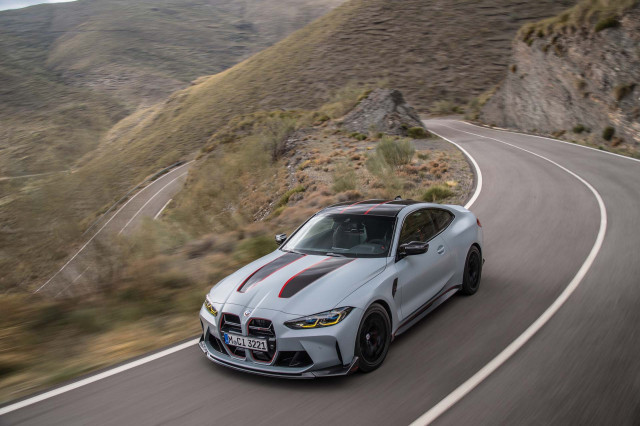 2023 BMW M4 CSL
2023 BMW M4 CSL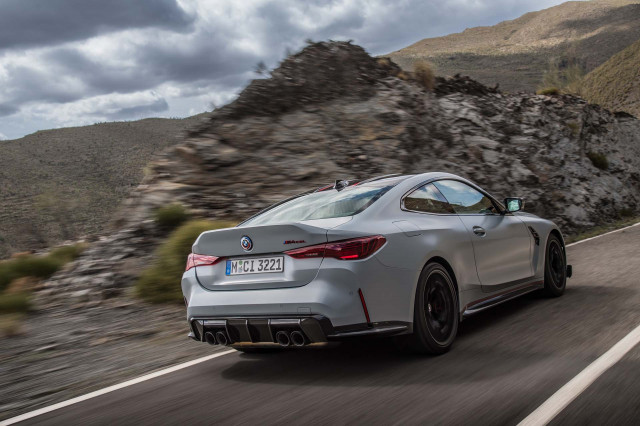 2023 BMW M4 CSL
2023 BMW M4 CSL 2023 BMW M4 CSL
2023 BMW M4 CSLThat’s good because the CSL also has the steering, handling, power, and braking to cut lap times. The ultra-responsive steering reveals itself with the first turn. It has a decently quick 15:1 ratio, but the car responds so willingly to my inputs through the chunky, synthetic suede-wrapped steering wheel that the ratio feels much faster.
While the steering weights up at speed, it’s not enough. It’s easy to place the car from turn to turn, but the somewhat light feel and quick-twitch nature of the tuning require a series of small inputs in longer, sustained corners.
Numerous weight savings measures and a chassis that’s enhanced from the already stiff M4 contribute to the lightning quick responses. BMW enhances the chassis with a 0.3-inch lower ride height that lowers the center of gravity. A new front strut brace and stiffer engine and transmission mounts tie the front end together even tighter, and four stiff rear ball joints replace rubber mounts for a more direct connection. The CSL also has specific tuning for the camber, dampers, and anti-roll bars.
A lot of carbon-fiber-reinforced plastic (CRFP) inside and out cut weight, too. The trunk, hood, and interior center console take out 24 pounds. CRFP is also used for the unique front splitter, rear diffuser, and mirror caps, as well as the roof, which is also CRFP on the M4 Competition. All told, the M4 CSL weighs in a very reasonable 3,640 pounds.
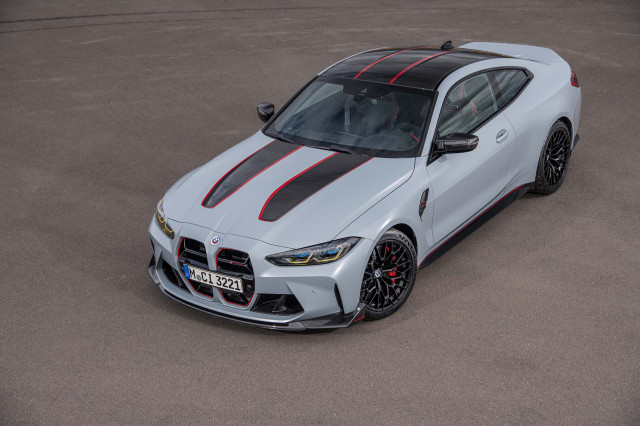 2023 BMW M4 CSL
2023 BMW M4 CSL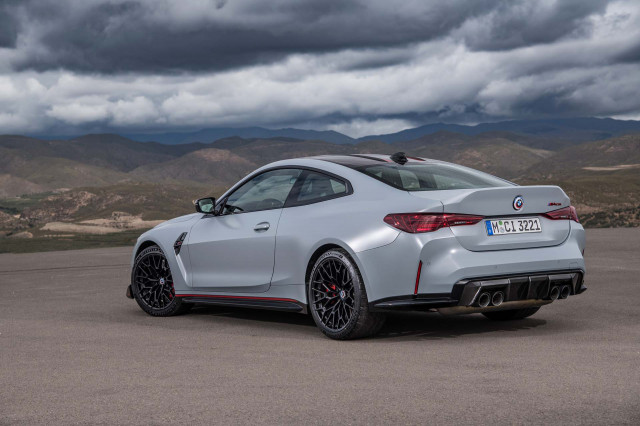 2023 BMW M4 CSL
2023 BMW M4 CSL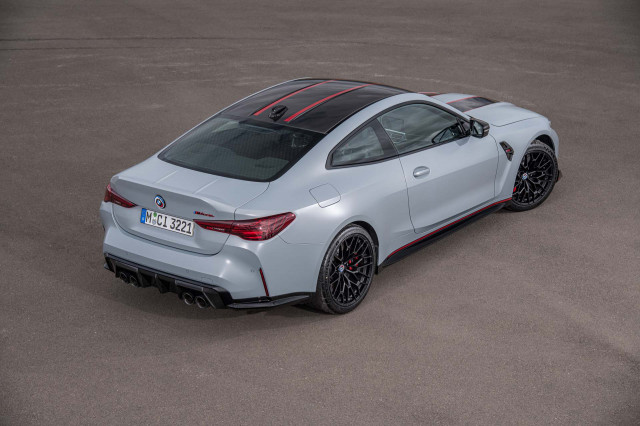 2023 BMW M4 CSL
2023 BMW M4 CSLThe M4 CSL attacks the corners of this desert mountain with a flat attitude, and welcomes quick changes of direction when the corners string together. As for how it handles at limits of grip, well, that I can’t say, and thus my frustration. Between the close guardrails on this two-lane mountain road and my sense of self-preservation, I’m not going to dare to push too hard or attempt to slide the car through corners and risk my health or the health of the car. The upgrades obviously work, though, because the M4 CSL is the fastest BMW ever to lap the Nürburgring Nordschleife with a time of 7:20.2. Max cornering is best left to a track, and I hope to someday experience this car there.
I can say, however, that the standard carbon-ceramic brakes, which save another 31.5 pounds, have a sturdy, natural pedal feel, and are more than a match for this road. With 15.7-inch front rotors clamped by 6-piston calipers and 15.0-inch rear rotors with single-piston calipers, they could handle track time, too.
The full hog version of BMW’s S58 twin-turbo 3.0-liter inline-6 lurks under the sculpted and striped hood. It spins up 543 hp and 479 lb-ft of torque, an additional 40 horses versus the M4 Competition thanks mostly to 30.5 psi of boost instead of 24.7 psi and updated ECU tuning. Unlike the M4 Competition that offers rear- or all-wheel drive, the M4 CSL sends all that power exclusively to the rear tires.
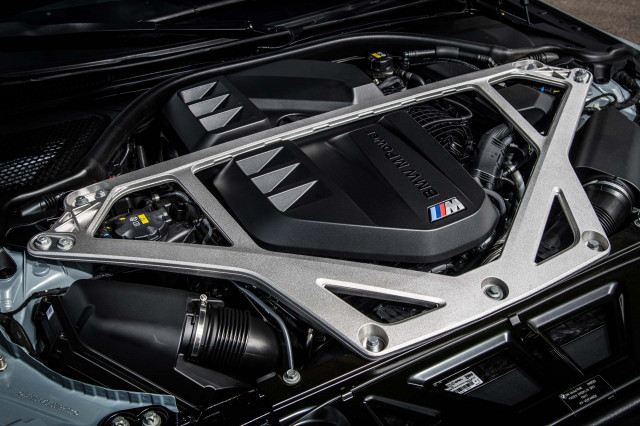 2023 BMW M4 CSL
2023 BMW M4 CSL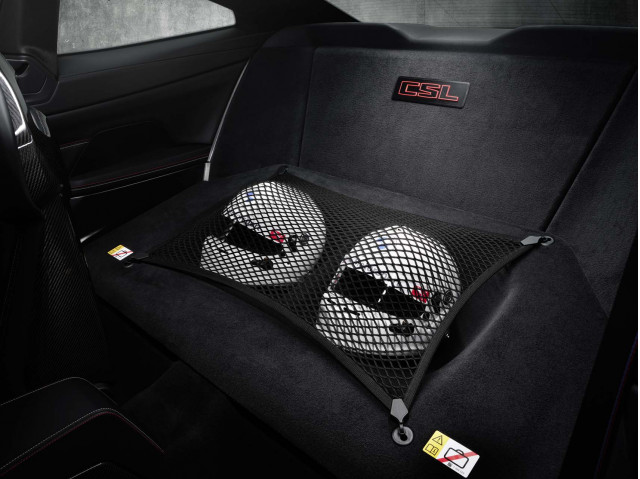 2023 BMW M4 CSL
2023 BMW M4 CSL 2023 BMW M4 CSL
2023 BMW M4 CSLIn the few moments I get between slow-moving Camrys, the engine shows its colors. The inline-6 revs quickly and catapults the car forward with as much speed as I dare. The 0-60 mph sprint takes just 3.6 seconds, according to BMW, and the top speed is 191 mph. Power is readily available down low, and max torque comes on at 2,750 rpm and stays on boil until 5,950 rpm, 400 rpm longer than the M4 Competition. Max horsepower arrives higher at the same 6,250 rpm as the Competition. Again, I’d really like to experience it unfettered on a racetrack.
The engine feeds its power to the rear wheels through a fast-acting 8-speed dual-clutch automatic transmission. The two steering wheel M buttons are programmable and this one has the powertrain set to its most urgent Sport+ setting. As I approach corners and hit the brakes, the transmission actively seeks the lowest possible gear for the best power when exiting each turn. I can also take over shifting duties by tapping the carbon-fiber steering wheel paddles, but the transmission is finding the low gear and blipping the throttle between shifts, so that’s not necessary.
Sport+ gives the powertrain a high-strung character during this run, but the Comfort and Sport settings tone things down to make a comfortable return trip in Palm Springs traffic.
Part of the CSL’s diet includes less and lighter sound deadener that team up to let in more engine sound and cut another 33 pounds. BMW also uses two electronically controlled exhaust flaps and a titanium rear exhaust silencer to create a unique, more present sound and save another nine pounds. The inline-6 barks during hard acceleration and burbles on overrun to let you know it means business. It also drones too much for daily driving, though mostly only when getting deeper into the throttle.
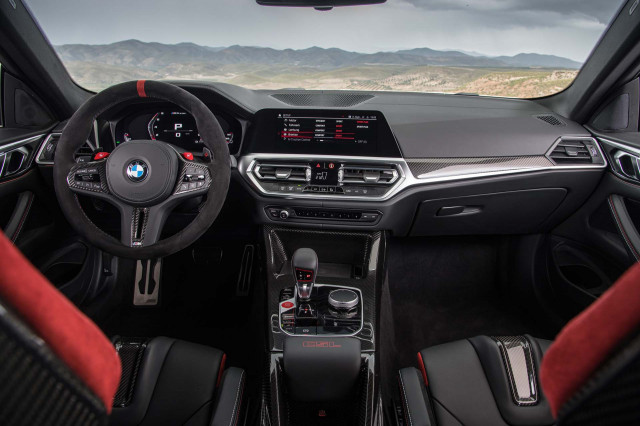 2023 BMW M4 CSL
2023 BMW M4 CSL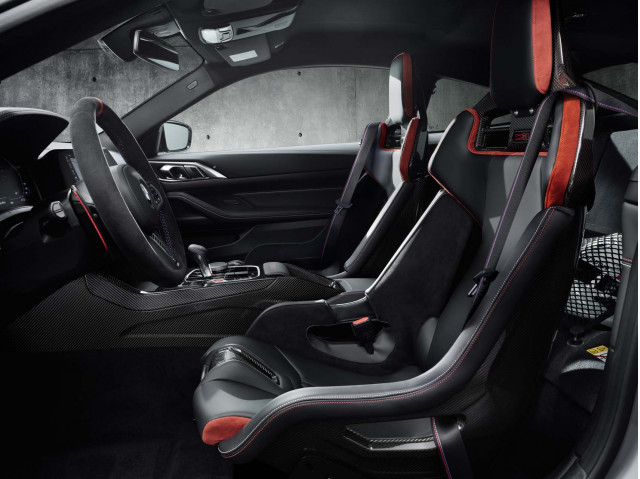 2023 BMW M4 CSL
2023 BMW M4 CSL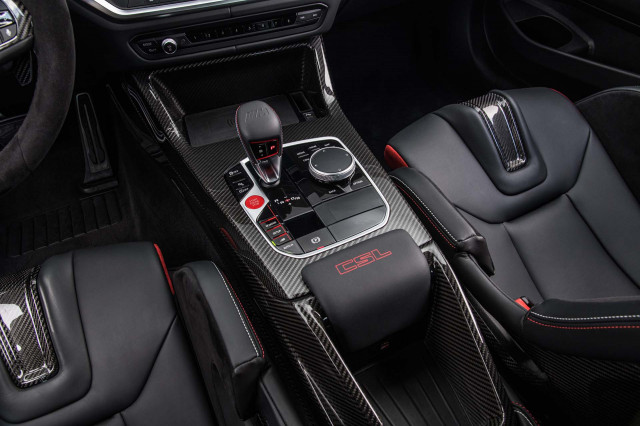 2023 BMW M4 CSL
2023 BMW M4 CSLThe M4 CSL has some features I don’t bother to mess with given the limitations of the road. It has 10 traction control settings compared to five for the M3 and M4 Competition and maybe two or three for the typical sporty car. Setting one allows the most slip and setting five the least. Settings 6-10, however, are aimed at ideal lap times based on the track surface, with six and seven for a dry track, and eight to 10 for cold tires or a wet or slippery track. I’m not spinning the tires here or stepping out the rear end, so there’s no need to play with the settings.
If I really wanted to play, BMW has a Drift mode and a Drift Analyzer that can measure a drift’s angle, its length in yards, and its understeer percentage. Again, that’s best left to a track.
BMW charges a pretty penny for its most capable sport coupe. It starts at $140,895, a whopping $53,700 more than the M4 Competition, and is limited to just 1,000 examples worldwide. It’s an exclusive car, for sure—one with exclusive performance.
BMW paid for airfare and lodging for Motor Authority to bring you this firsthand report.
Related Articles
- 2023 Porsche 911 Dakar makes the off-road sports car mashup a reality
- 2023 Chevrolet Corvette Z06 strapped to a dyno makes 610 hp
- Review: 2023 Honda Civic Type R grows up but remains fun
- Radical teases 850-hp flagship track car
- Lucid teases Gravity electric SUV due in 2024





































